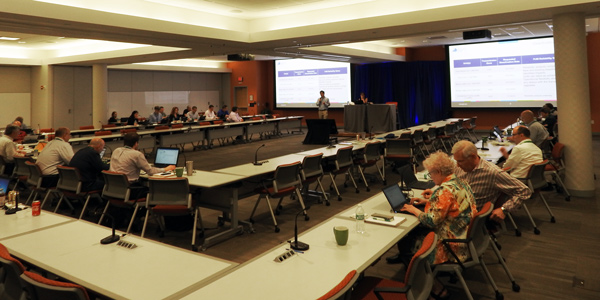VALLEY FORGE, Pa. — PJM’s Patricio Rocha-Garrido last week briefed the Planning Committee on proposed Manual 20 changes to revise how winter peak weeks are calculated.
Staff say the new methodology is necessary because the current “theoretical” approach used in PJM’s PRISM modeling software to estimate RTO-wide generator outage levels during the winter peak does not reflect historical outage levels. Staff proposed using historical outage data to build the winter peak week’s capacity model.
Stakeholders asked for additional data to confirm that PJM has determined the best option.
Rocha-Garrido added that the revisions are only necessary for winter peaks and that he didn’t see any “far-right tail” indicating problems with PRISM’s analysis of summer conditions.
“We took a look at the summer, and we were comfortable with what we saw. What PRISM is doing reasonably matches historical data,” Rocha-Garrido said.
AMP Disappointed with Cancellation of Ratings Discussion
American Municipal Power’s Ed Tatum said he was “exceptionally disappointed” that staff and PC members decided to skip discussion of NERC Standard FAC-008-3, which governs how transmission owners must document their methodologies for calculating facility ratings.
Committee members decided to table it until next month’s meeting after the discussion on incorporating cost containment in transmission planning ran long. (See related story, Cost Containment Proposal Survives; Headed to MRC.)
TEAC Redesign
PJM’s Aaron Berner walked through revisions to Transmission Expansion Advisory Committee processes to increase transparency and opportunities for stakeholder input.
Greg Poulos, executive director of the Consumer Advocates of the PJM States, voiced his approval of the changes.
“It’s very noticeable. You’ve done a great job,” he said of PJM’s efforts to provide information sooner.
Tatum suggested adding information to templates that addresses repeatedly asked questions.
“That is definitely one of the things on our mind to try to short-circuit … the need for some of those questions,” Berner said.
Reliability Upgrades Needed for Nuclear Deactivations
Staff said they completed an analysis on the reliability impact of the retirements of FirstEnergy’s Davis-Besse, Perry and Beaver Valley nuclear plants, which the company announced last month. (See FES Seeks Bankruptcy, DOE Emergency Order.)
While the plants can retire as scheduled, transmission upgrades will be necessary, staff said. All projects that will need to be accelerated have been identified. Staff plan to bring details for all upgrades to next month’s TEAC meeting.
All projects will be classified as “immediate need” so they can be in place by the plants’ planned shutdown by the end of 2021, which means they won’t be competitively bid and will be awarded to FE to build.
— Rory D. Sweeney





